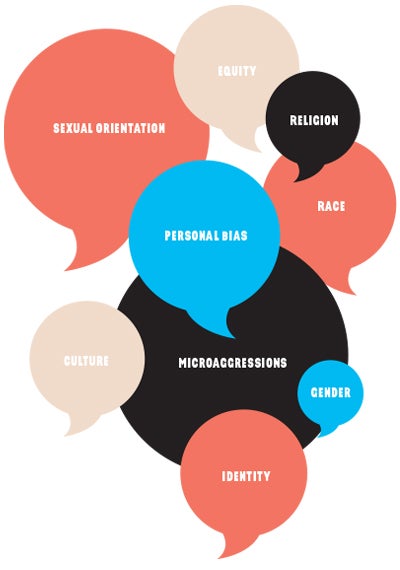Syllabus: Critical Dialogues on Diversity
This five-week, discussion-based orientation course explores critical approaches to culture, identity and dialogue fundamental to living and working at the university and essential for taking full advantage of a Rice education.
UNIV 195
Critical Dialogues on Diversity
DEPARTMENT
University Courses
DESCRIPTION
The university’s remarkable diversity enlivens and enriches all of its core missions. Such gains, though, are not all to be gotten passively. This five-week, discussion-based orientation course explores critical approaches to culture, identity and dialogue fundamental to living and working at the university and essential for taking full advantage of a Rice education.

A Space to Discuss Diversity
Rice is more diverse than ever before — people on campus identify with many different nationalities, races, colors, sexual orientations and religions.
“Diversity informs the solving of difficult problems, the kinds of problems that universities exist to address through research,” said Alexander X. Byrd ’90, Rice’s vice provost for diversity, equity and inclusion and an associate professor of history. “The way to solving those problems is made easier through intellectual diversity. Intellectual diversity is informed by identity diversity. Diversity also creates some problems because difference can create some friction, but we can learn ways to reduce that friction.”
The Critical Dialogues on Diversity (CDOD) workshops aim to begin a conversation about the importance of diversity, equity and inclusion across the university and the ways students interact with others throughout their years on campus. A recently added required course for new students, CDOD offered 44 sections during the fall 2021 semester and an additional six this spring.
The course opens up space for discussing the problem-solving capacity that diversity brings in addition to bringing issues to light like the problem of microaggressions — instances of personal bias and discrimination, often subtle or unintentional, that happen between people in day-to-day interactions. Students break into small groups to discuss hypothetical scenarios involving acts of discrimination and ways to respond personally to those acts, as well as what responses might be expected from leaders at the administrative level.
The workshops do not require readings or written assignments. Instead, they offer a chance for students to have these discussions honestly and freely and to ask questions that might be difficult or uncomfortable to broach under other circumstances.
Jorge Arnez Gonzales ’25, a Bolivian international student at Brown College, said, “At the end of the day, we all have growing to do. … I disagreed with some others’ comments, but that’s part of dialogue: to try to understand the other person’s position.”
— Jenny West Rozelle ’00
